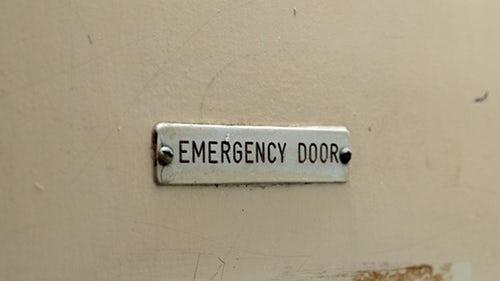I was doing a lot of yelling and repeating myself Saturday night and early Sunday morning in a hospital emergency room. After six hours of it, I was getting a bit exhausted and frustrated. Like it or not, though, it had to be done. There was no way around it. But I ended up learning a lot of lessons.
Emergency rooms are not where you look forward to spending your Saturday evenings, especially when you have a movie date planned with your beloved, and you’ve just spent the most glorious day with him—lingering over a l-o-n-g, delicious brunch, shopping, and sweating during a workout in the gym.
Then, on the way home from my glorious day, looking forward to that movie date, I got the call: my mother had fallen and been transported to the nearest hospital. My beloved and I found ourselves making a swift U-turn and heading to the ER in our sweaty gym clothes.
I spent the next five hours—except for a brief sandwich run—standing (and sometimes sitting) in a tiny ER cubicle keeping my mother company, communicating with her patient and efficient nurse, and awaiting the official diagnosis of her clearly fractured collarbone.
It’s not easy communicating with someone who’s nearly deaf. If she could still read lips, it would be easier. But she can’t do that anymore, either. Macular degeneration has wiped out all but the shadows from her vision. She looks at you but doesn’t really see. So I have to raise my vocal decibels to painful ranges (for both me and other people in earshot) to be heard by her. She often only manages to catch snippets of the sentence or conversation.
Saturday night I was in the happiest and most compliant of moods, thanks to my already-stellar day, so I tolerated the mental and physical strain fairly well. And I kept reminding myself of several things:
1. My mother wasn’t being difficult on purpose.
Although my mother has a reputation for being extremely difficult, she wasn’t Saturday night. That was the first miracle. She actually let me talk to the doctor without interruption. She was scared, she needed me, and she finally trusted me to make decisions for her, without her muddying up the process.
- I reminded myself to smile. Often.
A very wise man once wrote that laughter and smiling are good for the bones, and he was so right. It helped relieve my stress. While my mother’s sensory issues aren’t a laughing matter, my having to repeat myself a half-dozen times became funny. Sometimes I tried imparting the message several different ways—dumbing down complex words that would be hard for her to decipher. It became a mental challenge for me. Smiling kept my mood lighthearted and less defensive.
- Life gets interrupted, and oftentimes it’s better to go with the flow than wrestle with it, internally or externally.
Sometimes, letting life just be the way it is results in enjoying the otherworldly peace we all seek. By that I don’t mean taking a morbid, fatalistic attitude toward it, but adopting an attitude of security and trust in the One Who does have control over the situation, knows how to handle it, and has your best interest in mind.
- I had a loving advocate available to me in the waiting room.
It certainly helped knowing that I wasn’t alone in this burden. My beloved was running interference by going home, tending to the dogs, gathering items for my mom at her place, and being a good listener (and sometimes yeller when I couldn’t get a message through). He asked me at one point whether he should just go home. I told him I needed him there, even if he was parked in the waiting room doing work on his computer. Thankfully, the young man at the front desk finally allowed two visitors in my mom’s cubicle, so he was able to squeeze in with us the last hour and a half.
Lessons learned—
And, of course, after the worst was over, my mother was safely ensconced in a hospital room, and Chris and I were able to go home, I started thinking about how much all of it reminded me of everyday life.
- We can spend a lot of time yelling at others about things they can’t or won’t hear.
Often, especially with our children, we need to sound like broken records—repeating, repeating, repeating, until it sinks in (or doesn’t, and they have to learn it the hard way on their own).
- If we do have to repeat, repeat, repeat, it’s often best do to so with a smile in your heart, if not on your face.
We don’t want to look like condescending jerks when we’re doling out advice. The smile is more for you, the repeater, so your words come across as more loving than angry or frustrated. You know, like at the end-of-your-rope mad.
- A lot of our communication with God must seem like yelling to Him.
Because my mom can’t hear, she tends to yell when she talks, even in places where being subdued is the expectation.
We get nervous about our situations, and then we YELL! Like God’s going to be able to hear us any better or move faster on our behalf, or move us and our problems to the head of the problem line. Like babies, we don’t think He hears us, so we make sure He—and everyone in the room—does. I started laughing thinking about what it looks and sounds like from His position.
- We interject ourselves into the situation in a belief that we’ll solve the problem sooner or better, ignoring the fact that God really does love us, does have everything under control, and not realizing that our interjection only muddies the outcome. I wonder how often we slow the process down by getting too involved, by trying to control others and the outcomes.
- Life is always better when you have an advocate, one you can trust and lean on.
For a Christian, your first advocate is Jesus Christ. He’s the One with a direct line to the Father. He’s the One you take your problems to for solving. And when you do, you trust Him to do just that. And you demonstrate your trust by stepping back, without interrupting or trying to manipulate or control the situation, let the Father and Son discuss it and plan a perfect course of action.
Another type of critical advocate is the one with skin on. The one who shows up with you, waits hours with you, listens with you, maybe talks for you, intervenes for you, supports you, and provides a shoulder and hand to lean on and grasp. An advocate who will laugh and cry, and be a sounding board. An advocate that will also carry your concerns and pains and cares to the throne of grace.
Every difficult, stressful and exhausting thing about Saturday night was relieved and tempered by my having the most important person in my life by my side. And then knowing—when I filled out the prayer request card in service Sunday morning—that I’d have a church body lifting my mother and me up in prayer.
It made life so much more bearable.
And then I learned one more lesson.
While situating my mother in her bed in the hospital room, the tech tried talking to her from the end of her bed. “She won’t be able to hear you,” I told her. She nodded, and then did the most loving thing.
She walked to the head of the bed, leaned over, and got as close to my mother’s ear as she could to speak to her. She still had to crank her voice to a louder-than-normal volume for my mother to hear her, but her actions caused both of the you-are-such-an-idiot, Andrea; and you-better-be-taking-notes lightbulbs to snap on in my tired brain.
That nurse talked to my mother as God usually talks to us.
He gets as close as He can—as long as we let Him near—to speak to us. Sometimes He whispers because whispering forces the hearer to listen more closely. He doesn’t usually yell, although sometimes His anger has been known to rouse Him and crank up His volume. Sometimes, when we don’t listen or convict ourselves, He disciplines us to a point that we feel as though we’ve had our legs cut off from under us.
It’s a position I need to take more often with my hard-of-hearing mother. It’s a position I need to take more often with my loved ones.
Rather than standing up, or even leaning over a little to yell, I need to come as close as I can to speak—in an even, slow cadence.
In love.
Until next time,
Repeat yourself with a smile in your heart, and move in close!
Blessings,
Andrea
 Andrea Arthur Owan, M.S., A.T., R., is a fitness pro, chaplain, and an award-winning inspirational writer. She works and writes to help people recover from grief and loss and to live their best lives — physically, emotionally, and spiritually.
Andrea Arthur Owan, M.S., A.T., R., is a fitness pro, chaplain, and an award-winning inspirational writer. She works and writes to help people recover from grief and loss and to live their best lives — physically, emotionally, and spiritually.


 Andrea Arthur Owan, M.S., A.T., R., is a fitness pro, chaplain, and an award-winning inspirational writer. She works and writes to help people recover from grief and loss and to live their best lives — physically, emotionally, and spiritually.
Andrea Arthur Owan, M.S., A.T., R., is a fitness pro, chaplain, and an award-winning inspirational writer. She works and writes to help people recover from grief and loss and to live their best lives — physically, emotionally, and spiritually.

